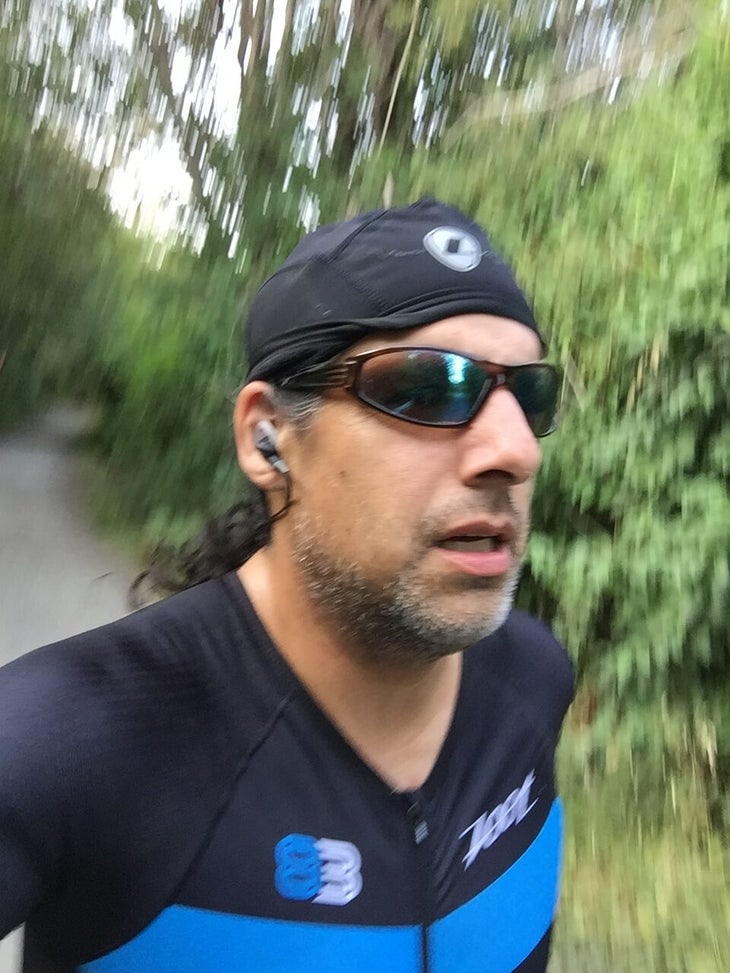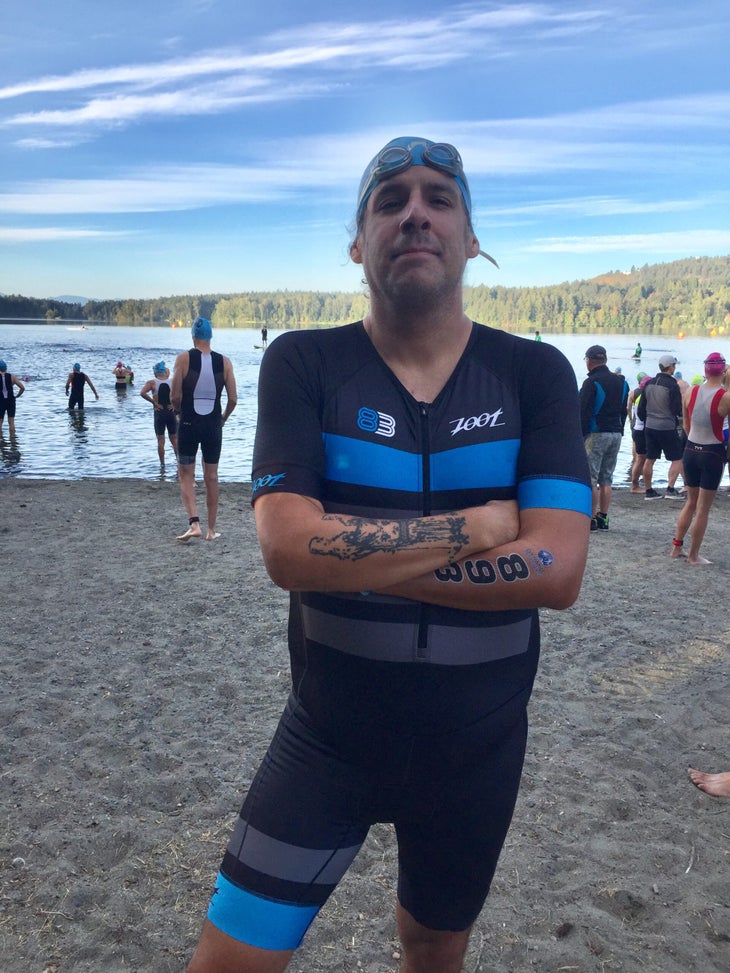[ad_1]
“], “filter”: { “nextExceptions”: “img, blockquote, div”, “nextContainsExceptions”: “img, blockquote”} }”>
For access to all of our training, gear, and race coverage, plus exclusive training plans, FinisherPix photos, event discounts, and GPS apps,
>”,”name”:”in-content-cta”,”type”:”link”}}”>sign up for Outside+.
On a late summer day in 2014, sitting on a patio with a few friends, Mike Alexander grabbed a drink.
With the beverage in his hand, he dreamed of living a better life. A life not mired by alcoholism. A life where he didn’t feel the urge to grab a drink. Weighing over 320 pounds and months away from a type two diabetes diagnosis, Alexander longed for a fresh start—but he didn’t know where or how to start.
As a child growing up outside of Winnipeg, Alexander was adopted out of his Anishinaabe community, one of the groups of indigenous First Nations peoples in Canada, as part of a wider colonization practice that pushed indigenous children out of their homes and families. Between 1960 and 1990, the Canadian Department of Indigenous Affairs reported that 11,132 children were adopted from their families and communities into primarily non-Indigenous households as part of a movement now referred to as the “Sixties Scoop.” Recent estimates suggest the number was actually over 20,000. The practice was most popular in the prairies—Manitoba, for example, “adopted” about 3,400 indigenous children between 1971 and 1981 alone.
For years after his forced adoption, Alexander never understood why he wasn’t able to find connection with his indigenous friends or family. Although he tried to learn about his culture, he struggled, and turned to alcohol to numb his emotions and reduce the pain he felt as an outsider in his own community.
“Self-destruction has been my MO since I was a kid,” Alexander said, from his new home, the Skwachays Lodge, in Vancouver. “The alcoholic mind in me needs me to destroy anything that’s good in my life.”
So that late-summer evening, hanging out with friends in the backyard, he was ready for a new beginning. He was preparing to move west. He had just started riding a bike, and was watching some of his weight slowly melt off. And that’s when a lifelong friend, Todd, made a suggestion.
“What if you, like,” Todd paused. “Did a triathlon one day? You’re doing well on the bike, what if you did something totally outrageous like that?”
Everyone on the backyard patio all laughed, their chuckles echoing through the prairie. Alexander thought it was the most unrealistic feat imaginable. He dreamed of a new start, but that seemed impossible. It wasn’t until a few years later, when he finally hit rock bottom, that remembered the comment.

The day of reckoning came on January 25, 2016, months after he moved to British Columbia, when Alexander was admitted to the hospital after a failed suicide attempt.
He’d been diagnosed with major depression, was still drinking, and wasn’t working. He attempted to mix alcohol with prescription medication before being interrupted by police and taken to the hospital. After being released, Alexander decided it was really time to turn the dream into reality, to get sober and make changes in his life.
“Clearly I’m out of control,” Alexander said. “I can’t hide that, I can’t pretend, I said I’m going to try sobriety for the first time since I was 16.”
Throughout Alexander’s life, he’s always been able to give certain tasks, challenges, or habits his all—that’s partially what fed his addiction. But after his hospitalization, he decided to use his intense focus on positive outlets like exercise.
“If I went on a 30- or 40-kilometer bike ride, I felt good, and then I felt tired. Then there’s no point in leaving the house again because I wanted to sleep,” he said. “Then that sleep felt amazing, then I woke up feeling rested and that helped my mind focus for the next day.”
He started to self-coach, train seven to 10 hours per week, and came up with his own diet plan. He ended up losing around 110 pounds.
“It took me three years to learn how to fill a tire on my bike,” he said, with a laugh. “Because I wasn’t training with anyone, nobody told me how to do this.”
Despite training solo, he continued to increase the time he spent on the bike and how far he went. He found solace in the routine: wake up, exercise, sleep.
Thinking back to Todd’s comment from years ago, he added running and swimming, and signed up for his first triathlon in 2018.
“I did some big rides and learned that there was very little stopping me from pushing myself as hard as I wanted. When you realize that, that’s when you think, ‘I could maybe do a triathlon,’” he said.
At the age of 43, Alexander completed his first Olympic-distance triathlon, and has since done three more races.
“It’s scary, it’s a huge feat, [triathlon] is one of those things where people sit around a water cooler and are like, ‘woah.’”
He was also recruited to join 7mesh, a bike apparel company based near him in Squamish, to be an ambassador of their product and collaborate on future gear designs.
“He’s supporting us and we’re supporting him. When it comes to some of the issues Mike’s dealt with in his life, the things he’s faced, the life he lives as an indigenous person, he’s on his learning journey just like I am and we are as a company,” said Tyler Jordan, co-founder and CEO of 7mesh.
“His enthusiasm is infectious, and he wants to share the joy of cycling with other people.”

In 2018, before his first triathlon, Alexander told the CBC that he wanted to serve as an inspiration for other indigenous athletes.
“When I see a triathlon magazine, running magazine, or anything really, I see the same people on those pages,” Alexander said. “Well-to-do, white folks with magazine-type bodies, who have disposable income to spend on their amazing adventures… I don’t think people on [reservations] relate to that, I don’t think they see themselves represented.”
Despite the sport’s challenges with accessibility, he enjoys the process of training for three disciplines and finds community in races. He also stays in touch with many triathletes and has plans to compete in a race in May with a fellow Sixties Scoop survivor. “I’m going to fit in so well with her at this [race] and I like that.”
It’s easy to think that triathlon alleviated all of his trauma, but that’s not true. Instead, it’s just one outlet that helps him cope. Alexander is also an artist who uses paintings and visuals to connect with his Anishinaabe background. He’s a writer and a poet, and he’s someone who knows mental illness and alcoholism are things he will have to navigate for the rest of his life.
On an early February afternoon recently, Alexander sat in the main boardroom of the Skwachays Lodge, Canada’s first indigenous arts hotel, where his artwork is displayed with other artists living in the building. His cloth mask read across it: “NATIONAL INDIGENOUS DIABETES ASSOCIATION.”
He still has bad days, but triathlon training is something that comforts him. He hasn’t ruled out the possibility of completing an Ironman one day.
“I’m familiar with the pain that comes with endurance training,” he said. “I’ve made the choice to go through it because I can learn from it, I can control that pain, and use it to help me in life. That’s why I relate to triathlon.”
As he unlaces the mask from his hands, loops it around his ears, and under his long, dark-brown hair, he talks about tonight’s workout. Yesterday, for instance, he didn’t go as hard in a stationary bike ride and when he tried to sleep, he had excess energy jolting through his body.
He should go for a run, he says, but there is something about the pool that is calling his name today.
A long swim, a full-body workout, is what he suddenly decides to do. An afternoon in the pool to put his mind at ease, because when he gets his arms moving, legs kicking, and endorphins flowing, he’ll find the motivation to do it all over again tomorrow.
RELATED: Mental Health Resources for Triathletes
[ad_2]
Source link

